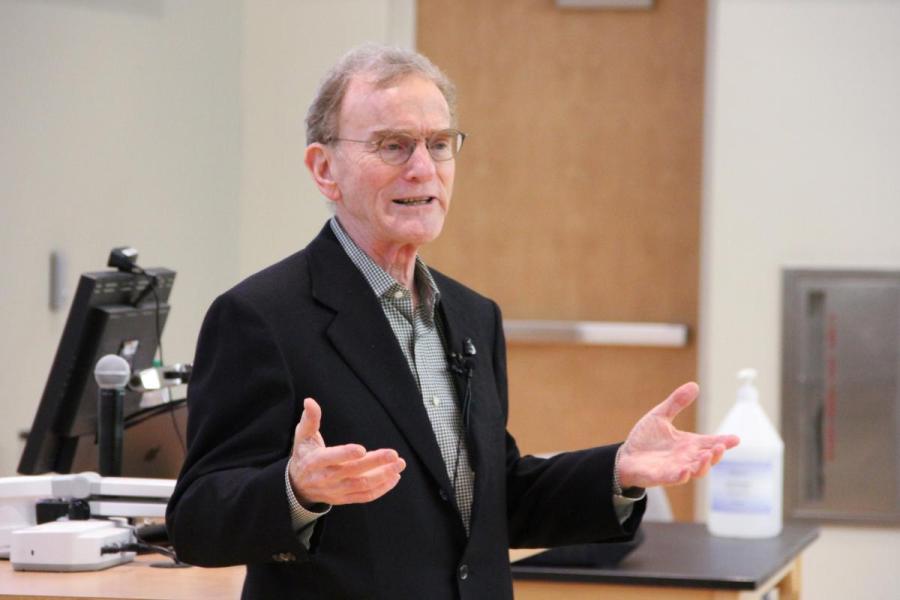Nobel laureate Randy Schekman visits FSU for colloquium on cellular trafficking and membrane repair

The Florida State University Department of Biological Science, part of the College of Arts and Sciences, hosted Nobel laureate Randy Schekman last month, for a colloquium discussing advances in the field of molecular and cell biology.
Schekman is a Howard Hughes Institute Investigator and Professor of Cell and Developmental Biology at the University of California — Berkeley and devotes his research to the cell membrane assembly process and vesicular traffic in eukaryotic cells, or cells that have a nucleus. He was awarded the 2013 Nobel Prize in Physiology or Medicine, alongside James E. Rothman of Yale University and Thomas C. Südof of Stanford University, for groundbreaking work in identifying the components that regulate the transport and secretion of proteins in eukaryotic cells.
“Hosting a Nobel laureate is a coveted event that provides premier benefits to our students and faculty,” said Sam Huckaba, the college’s dean. “Randy Schekman’s timely visit to our Department of Biological Science will be remembered by all who attended.”
Human cells contain specialized compartments, and each compartment plays a particular role in carrying out the duties of the cell. Materials are transported between these crucial compartments in carriers called vesicles, and Schekman has discovered and characterized specific proteins involved in trafficking these vesicles throughout the cell. This research informs how important molecules such as antibodies and neurotransmitters, which serve as chemical messengers and neutralizers of foreign substances in the body including viruses, are synthesized within cells and then transferred out of the cell through cellular trafficking.
“Cellular trafficking is highly complicated with many proteins and complexes that mediate its function,” said professor of biological science Scott Stagg. “Randy uncovered many of the proteins involved in this process and has been responsible for determining how they work together to facilitate vesicular transport. His recent work has expanded on these discoveries and shown that continuous tubular connections can be formed between cells in certain conditions to facilitate the exchange of organelles and cellular materials between them.”
The work conducted in Schekman’s lab, assisted by graduate students, illuminates mechanisms for intercellular communication and signaling, providing a more complete understanding of the basic foundation of cellular biology. These findings have major implications for human health and medicine. Some of Schekman’s recent work focuses on exosomes, a type of vesicle that are secreted from cells and can be taken up by other cells. Exosomes have been shown to be excellent biomarkers that can identify cancer cells and may also have roles in intercellular trafficking, explaining how these cancer cells affect other cells.
Schekman is the founding editor and served as a driving force behind the creation of eLife, an open access, peer-reviewed scientific journal publishing significant work in the biomedical and life sciences. It was established by the Howard Hughes Medical Institute, a science nonprofit and philanthropic organization supporting basic research and diversity in STEM education; the Max Planck Society for the Advancement of Science, an independent nonprofit association of German research institutes conducting research in life, natural, human and social sciences; and Wellcome Trust, a health research-focused charity based in the United Kingdom.
Like Schekman, eLife’s mission is to publish, review, and curate high quality science accessible to not only scientists but to the general public. Schekman has also served as an editor of the Proceedings of the National Academy of Sciences and the Annual Review of Cell and Developmental Biology, and he holds memberships in the National Academy of Sciences, the Royal Society of London, and the Philosophical Society.
“I had a great time at FSU, especially interacting with the biology graduate students. Folks who attended this lecture raised some great questions, and we all learned new things from these valuable interactions,” Schekman said. “This research and these types of discoveries are motivated by scientists’ desire to have a basic understanding of how life works, which lead to profound applications.”
